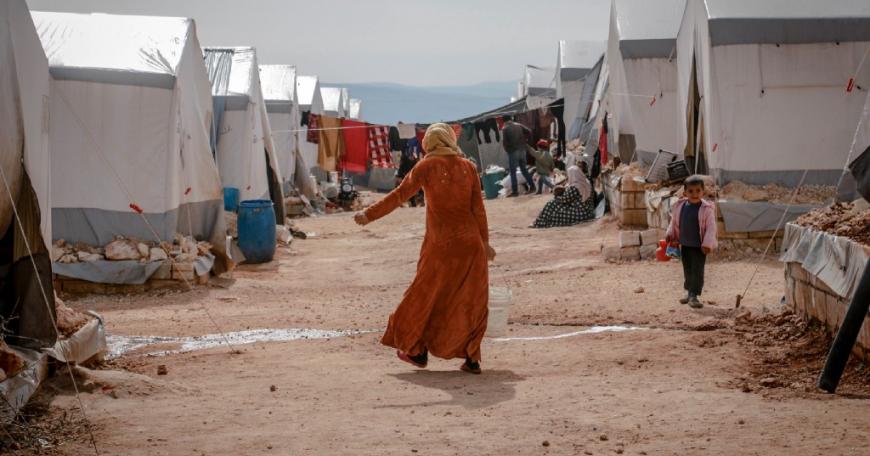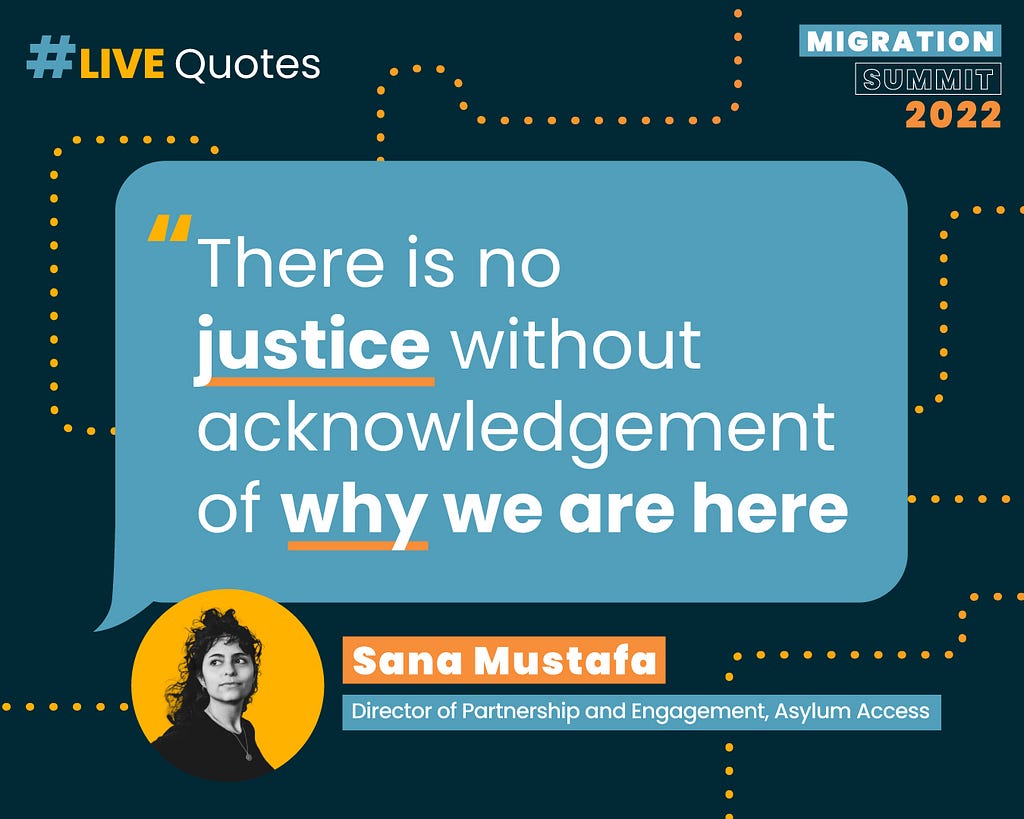
Migration Summit 2022
Week 1 recap: key learnings and discussions
By Lily Zhang, Elza Meiksane, and Camila Massa
The 2022 Migration Summit, running throughout the month of April, explores the theme of “Education and Workforce Development in Displacement,” seeking to build bridges between diverse refugee and migrant communities, educational institutions, and important stakeholders to collaboratively address key challenges and identify opportunities with and for refugees and migrant communities. Below is a recap of key learnings from the first week’s sessions, from the perspective of three participants and volunteers.
Displacement, an age-old challenge afflicting humanity
Panelists Dr. Peter Senge of MIT J-WEL, Lorraine Charles of Na’amal, Demetri Fadel of Karam Foundation, and Dr. Lana Cook of MIT Refugee Action Hub (ReACT) further elaborated on the mission of the Summit, which is one of empowerment, collaboration, and social responsibility. Charles reminded us that the only thing which differentiates between a refugee and a non-refugee is a political label, and as humans, displaced persons have a right to access education and livelihood. Senge added that alongside universal humanity, what distinguishes us as a species is social ability — the ability to collaborate, to empathize, and to assist one another. Hence, we have a duty to think about how to create a vision of education for everyone around the world. This sense of duty is only more heightened now: not only is displacement an age-old tragedy afflicting humanity, but the problem has only been exacerbated in recent years.
Continuing on the theme of reflecting on both personal challenges and structural issues confronting refugees, Sana Mustafa from Asylum Access shared not only her own struggles as a forcibly displaced person, but also her insights on structural racism and colonialism rooted in current systems of accommodating refugees. She mentioned that the current international system refugees must navigate was drafted in haste by the imperial powers back in the 1940s, and have not been significantly reformed since. The current system that is supposed to be helping the forcibly displaced suffers from chronic money problems, with barely any funding going to local actors, and such problems are hardly acknowledged in the wider international discourse. She advocated for a profound change of language and modes of engagement within the current system, as well as going beyond the existing organizations alongside their expertise, in order to empower and give agency to refugees.

Education in Displacement
The Migration Summit invited those who had first-hand experiences assisting refugees in accessing education, or had themselves navigated the many challenges facing displaced persons trying to continue their education. Speaker Ayuk Peterkings recounted his difficult journey in bringing together Cameroonian students displaced across Nigeria and other host countries, meeting with government officials, and securing admissions as well as scholarships for them. He shared with us stories of hope and self-reliance through education, but also those of uncertainties and precarity due to challenges posed by inequalities and the Covid-19 pandemic.
Then, displaced scientist, Nael Yasri shared the inner battle he had as the uprising began in 2011 in Syria, when he had to decide whether to flee to continue his education alongside many other struggles and uncertainties he confronted before leaving his war-torn home country, which led him to call upon the global higher education community to lend a hand.
Gentille Dusenge recalled her difficult journey of navigating education after leaving the refugee camp in a boarding school, as she felt out of place and was constantly worried about keeping ends met. Moreover, as she recalled, after finishing school she was twice rejected from university due to her refugee status before being finally admitted, which led her to call for raised awareness on refugee’s access to opportunities local and international, and for policy makers to rethink how to break unnecessary barriers to displaced persons accessing education — “for education policy to be effective refugees need to be involved in the planning and design process.”
During the keynote session “Pathways to Education, Livelihood, and Hope,” MIT President L. Rafael Reif shared the personal story of how his parents fled Eastern Europe in 1938, bringing barely anything apart from their education, which inspired him throughout his life journey, even to this day, when education is being radically transformed by digital learning. Continuing on the theme, Sanjay Sarma, Vice President for Open Learning, argued for an agile continuous education system to meet the needs of an agile workforce through different means, and described how flexible online learning and credentials may benefit learners in complicated situations of education and career disruption.
A hands-on session followed with the Syrian Youth Empowerment (SYE), an organization that helps conflicted-impacted students navigate university admissions processes and identify and apply to already existing scholarships worldwide to access higher education. SYE Operations Manager Elysa Bryen, Co-Founder Majed Abdulsamad, Yasmin Eltawil (Grad Program Lead, SYE), Mark Jabbour (Mentor & Advisory Committee Member, SYE) and MIT ReACT learner Ahmed Haj Ahmed guided the Migration Summit community into a hackathon that honed in on how we can break down a subset of barriers around helping universities and institutions of higher education adapt to the specific needs of displaced learners in their admissions processes.
The Migration Summit’s goal is not only uplifting voices and hearing inspiring life stories, but also establishing shared forums and safe spaces for experimentation and honest discussion to create connections and activate change around the challenges faced.
Creating long-term impact projects
Lorraine Charles (Na’amal), Marcello Bonatto (Re:Coded), Katrina Too (Open Door Policy), Lina Sergie Attar (Karam Foundation), and Majed Abdulsamad (SYE), all co-founders of different refugee serving organizations, shared the “why” behind their valuable work. Albeit having started at different times and in different places, these why’s converged in the desire to help displaced persons to make the most of their skills and potential wherever they are, and to see them successfully accessing education and other opportunities in life.
In conversation with MIT Solve Executive Director Alex Amouyel, Majed Abdulsamad, the co-founder of Syrian Youth Empowerment, explained that his motivation to tackle every visa or application issue comes from realizing that he has put one more student on the path to higher education. For Lorraine Charles, Na’amal’s Co-Founder and MigrationSummit Co-Chair, COVID-19 served as the tipping point to convince others that remote work for refugees is a viable solution. Despite being told that it was more important to provide refugees with basic needs, Lina Sergie Attar persevered in her belief that it is just as important to create maker spaces. Katrina Too founded Open Door Policy when she realized that migrant communities had talent but were unable to apply for jobs. Marcello Bonatto, like many of the panelists, shared a singular goal to provide “the best quality of education for everyone disregarding the circumstances.”
On the topic of fundraising, they advised organizations and individuals to focus on building trust through good communication, building a proof of concept, and expanding their reach to more people. Additionally, to those who intend to join the cause, they advised looking to those who need help, to remember the cause, to recognize the duty to serve, to seize the opportunity, and to learn on the way.
Then, we joined Lina Sergie Attar, Prof. Azra Aksamija, Saeed Arida, and Ramzi Naja in discussing the value of design-based learning for the forcibly displaced. Ramzi told us that design could become a way of empowerment for refugees, as they resist dehumanization and misrepresentation through creative means. Saeed emphasized the process of learning and the importance of open creative space, which was echoed by Lina who shared the story of her being motivated by the dreams of refugee youths into founding Karam house. On top of which, Lina added that studio work is an effective channel to processing trauma through war, and hence, while she could not end the war, she could empower the creative agency of displaced individuals to become future leaders.
Supporting emerging leaders and empowering refugee and disadvantaged children to learn is a shared mission with Thaki’s investment in building digital literacy and access among primary and secondary school children and educators. The organization was founded 6 years ago by Rudayano Abdo, “Thaki” in Arabic means “smart.” Phonetically, the word is pronounced “the key,” and the organization is helping to provide “the key” to children’s future to unlock their potential.
Empowering communities worldwide
Paul O’Keeffe virtually transported us to the Vijana Twaweza youth club in Kakuma refugee camp in Kenya through an engaging presentation. We saw how refugee youth navigated a difficult life in a contained camp, and sought to make the most of life despite the challenges. Undeterred by the difficulties, Dieu Merci Luundo and Gloire Lukambo Luundo — founders of the club — grew vegetables and raised animals, set up businesses, and attended online courses at the University of Geneva with the most limited provisions, but nevertheless excelled and even surpassed some students in Geneva who enjoyed some of the best resources. Gloire also pointed out their experience which reminded attendees of the harsh conditions and very limited resources available to refugees: almost half a million people lived in the camp with not enough food and in need of water efficiency. However, the ingenuity of refugee youth again triumphed over challenges, as they worked with students in Denmark to increase fish productivity, and are working on improving water efficiency and mushroom production. It was an inspiring story of astonishing resilience and of immense potential.
Amal Jibril and Suha Nabhan, the Founders of Migration Jam, a storytelling platform aimed at empowering migrant and refugee communities worldwide to facilitate positive change, told their own stories. Both Suha and Amal pointed out that currently there is a bubble around non-refugees who are largely ignorant of the extent of challenges which migrants face on a daily basis, which inspired them to found Migration Jam. Since the founding, the platform has empowered migrants to work in the create sector, to challenge biased mainstream narratives, and most importantly, to have a voice and a place to tell their own stories and reclaim their own representations.
With this powerful aspiration, we have concluded our sessions for the first week of the Summit. We have heard stories of struggles, trauma, and pain, which exposed us to the realities of lives of refugees; but we have heard yet more stories that reflected the amazing perseverance, ingenuity, agency, and potential of those impacted by displacement. This deepens our conviction in opening up access to education and livelihood opportunities. Next week, we will be welcoming even more speakers with stories and insights to share, please join us for another event-packed week. View our full calendar of events here: https://teamup.com/kseydd5t7xbcyuvchc
This piece was co-written by Migration Summit volunteers Lily Zhang and Elza Meiksanel:
Lily Zhang is a second year Human, Social, and Political Science (Politics and Sociology track) student at the University of Cambridge. “I am very passionate about using my research and writing skills to identify and overcome challenges faced by vulnerable communities.” Lily has volunteered at the largest refugee center in Auckland, and in teaching migrant children English, exposing her to the challenges that displaced communities face on a daily basis.
Elza Meiksane is a fourth-year student of Social Research and Public Policy in New York University, Abu Dhabi. She is a volunteer at a Latvian refugee NGO and helps by organizing donations in addition to translating documents. “As a project assistant with the Latvian Center for Human Rights, I have acquired valuable organizational skills. I have helped build bridges across more than 25 NGOs as part of a project to develop a more tolerant society.”
Migration Summit 2022 was originally published in MIT Open Learning on Medium, where people are continuing the conversation by highlighting and responding to this story.

